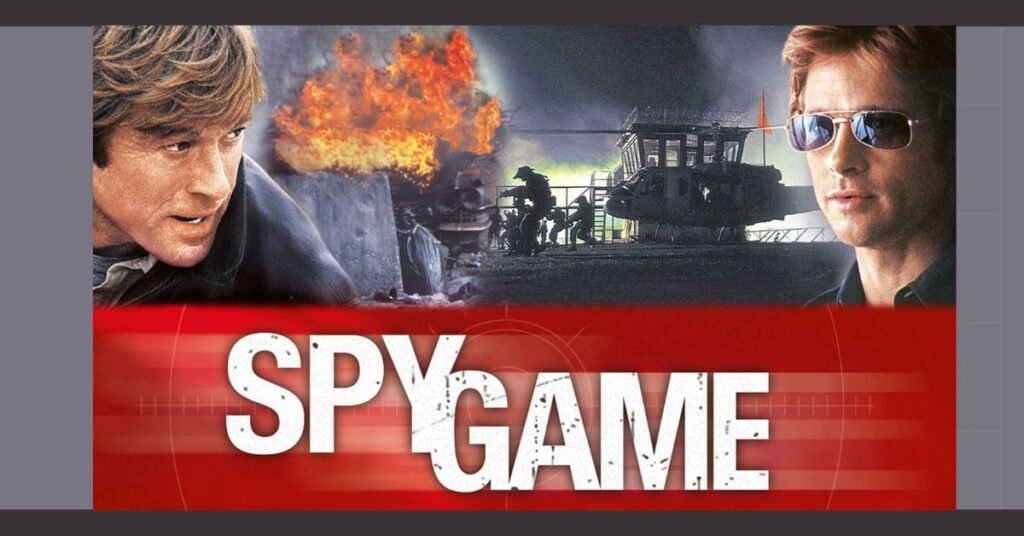In the world of cinema, few genres captivate audiences quite like the spy thriller. These films transport viewers into a world of intrigue, deception, and high-stakes missions, where the line between friend and foe is often blurred. Spy Game, directed by Tony Scott and starring Robert Redford and Brad Pitt, is a quintessential example of this genre. Released in 2001, this film offers a gripping narrative that delves into the complexities of espionage, loyalty, and the sacrifices made in the name of duty. In this Spy Game Review, we’ll explore the film’s plot, characters, themes, and overall impact, providing you with a comprehensive understanding of why Spy Game remains a standout in the spy thriller genre.
Table of Contents
Is the Spy Game Accurate?
While Spy Game is a work of fiction, it does capture the essence of the spy world with a fair degree of accuracy. The film portrays the complexities of international espionage, including the intricate planning, the moral ambiguities, and the personal sacrifices involved in such work. The use of flashbacks to depict various missions and the strategic thinking required in the CIA adds to the authenticity of the narrative. However, like many Hollywood films, Spy Game takes creative liberties to enhance the drama and suspense, so while it provides a glimpse into the world of espionage, it should not be taken as a literal representation of CIA operations.
What is the Story of Spy Game Summary?
Spy Game revolves around CIA operative Nathan Muir (Robert Redford) on the day of his retirement in 1991. Muir learns that his former protégé, Tom Bishop (Brad Pitt), has been captured in China during a rogue mission to rescue a woman from captivity. With Bishop facing execution within 24 hours, Muir must use all his skills and knowledge to orchestrate a covert operation to save him, despite the CIA’s intention to abandon Bishop to avoid an international incident. The story is told through a series of flashbacks that reveal Muir and Bishop’s past missions, their evolving relationship, and the ethical dilemmas they faced in the world of espionage.

Plot Overview
Spy Game is set in 1991, during the final days of the Cold War, and follows the story of CIA operative Nathan Muir (Robert Redford) on the brink of retirement. The film opens with the capture of Muir’s former protégé, Tom Bishop (Brad Pitt), who is imprisoned in a Chinese prison after attempting to rescue a woman from captivity. As Muir learns of Bishop’s predicament, he is called to CIA headquarters to assist in assessing the situation. However, Muir quickly realizes that his superiors intend to leave Bishop to his fate to avoid an international incident.
The narrative unfolds through a series of flashbacks that reveal the complex relationship between Muir and Bishop. These flashbacks take the audience on a journey through the duo’s past missions, showcasing their evolution as spies and the moral dilemmas they face along the way. As Muir works against the clock to orchestrate a covert rescue operation for Bishop, the film’s tension mounts, culminating in a gripping climax that keeps viewers on the edge of their seats.
Character Analysis
One of the most compelling aspects of Spy Game is its rich character development. The film’s two protagonists, Nathan Muir and Tom Bishop, are portrayed with depth and nuance, making them more than just archetypal spies.
Nathan Muir: Robert Redford’s portrayal of Nathan Muir is nothing short of masterful. Muir is a seasoned CIA operative, a man who has spent decades navigating the murky waters of international espionage. His character embodies the traits of a classic spymaster—calculated, pragmatic, and always thinking several steps ahead. However, Muir is not without his flaws. The film delves into the personal sacrifices he has made for his career, including strained relationships and a life lived in shadows. Muir’s loyalty to Bishop, despite the risks, adds layers to his character, making him a relatable and sympathetic figure.
Tom Bishop: Brad Pitt’s Tom Bishop is the idealistic counterpart to Muir’s seasoned pragmatism. Bishop is a younger agent, driven by a sense of justice and a desire to make a difference. Throughout the film, we see Bishop’s transformation from a naive recruit to a skilled operative, shaped by the harsh realities of the spy world. Pitt brings a raw intensity to the role, capturing Bishop’s internal struggle as he grapples with the moral ambiguities of his profession. The dynamic between Muir and Bishop serves as the emotional core of the film, highlighting the mentor-protégé relationship that is both complex and deeply human.
Themes and Symbolism
Spy Game is more than just an action-packed thriller; it’s a film that explores profound themes and uses symbolism to enhance its narrative.
Loyalty and Betrayal: At its heart, Spy Game is a story about loyalty—both to one’s country and to individuals. The film examines the bonds between Muir and Bishop, questioning the limits of loyalty in a world where betrayal is often a means of survival. Muir’s decision to save Bishop, even at the risk of his own career, underscores the film’s message that true loyalty transcends institutional allegiances.
Moral Ambiguity: The world of espionage is one of moral gray areas, where the ends often justify the means. Spy Game doesn’t shy away from this reality, portraying the ethical dilemmas faced by spies as they navigate a landscape of deception and manipulation. The film challenges viewers to consider the cost of such a life, both to the individuals involved and to the broader world.
The Passage of Time: Time is a recurring motif in Spy Game, symbolizing both the urgency of the mission and the inevitable passage of life. The film’s non-linear narrative, with its frequent flashbacks, reflects the way memories shape our present actions. Muir’s impending retirement serves as a reminder that time waits for no one, and the choices we make are often defined by the ticking clock.
Cinematic Style and Direction
Tony Scott’s direction is a key factor in the success of Spy Game. Known for his kinetic visual style and fast-paced storytelling, Scott brings a sense of immediacy to the film that enhances its tension. The use of quick cuts, handheld cameras, and dynamic angles creates a sense of urgency, placing viewers in the midst of the action. Scott’s background in action films is evident in the meticulously crafted set pieces, from tense interrogation scenes to high-stakes rescue missions.
The film’s cinematography, led by Daniel Mindel, is another standout element. The color palette shifts between the cool, sterile tones of CIA headquarters and the warm, gritty hues of the flashback sequences, reflecting the duality of Muir and Bishop’s world. The visual contrasts serve to highlight the film’s thematic exploration of duality—between duty and personal loyalty, past and present, and idealism and pragmatism.
Soundtrack and Score
The score of Spy Game, composed by Harry Gregson-Williams, plays a crucial role in setting the film’s tone. The music blends orchestral elements with modern electronic beats, creating a soundscape that is both timeless and contemporary. The score underscores the film’s tension, with pulsating rhythms during action sequences and haunting melodies during moments of introspection. Gregson-Williams’ music enhances the emotional impact of the film, making it an integral part of the viewing experience.
Critical Reception and Legacy
Upon its release, Spy Game received generally positive reviews from critics, who praised its intelligent script, strong performances, and taut direction. Robert Redford and Brad Pitt were particularly lauded for their on-screen chemistry and compelling portrayals of their characters. The film was also noted for its timely exploration of Cold War politics, coming at a moment when the world was still grappling with the aftermath of the Cold War.
While Spy Game may not have achieved blockbuster status at the box office, it has since gained a dedicated following among fans of the spy thriller genre. The film’s exploration of timeless themes, coupled with its stylish execution, has earned it a place as a modern classic in the espionage genre. It continues to be appreciated for its nuanced storytelling and the way it challenges conventional notions of heroism and loyalty.
How Did The Spy Game End?
Spy Game concludes with a tense and dramatic resolution. After a day of covert planning and manipulation, Nathan Muir successfully orchestrates a rescue mission for Tom Bishop, leveraging his knowledge of CIA protocols and his deep network of contacts. Muir risks his career and future to save Bishop, whom the agency was willing to sacrifice for the sake of diplomacy. The film ends with Muir’s retirement being finalized, but not before he ensures Bishop’s safe extraction from China. The ending highlights Muir’s loyalty to his protégé and his willingness to defy the system to protect those he cares about.
What is the Story Behind The Spy?
The story behind Spy Game lies in the mentor-protégé relationship between Nathan Muir and Tom Bishop, set against the backdrop of the Cold War and the waning days of international espionage as it was traditionally known. The film explores how Muir recruits and trains Bishop, turning him into a skilled operative. Throughout their missions, Bishop’s idealism often clashes with Muir’s seasoned pragmatism. The story is a meditation on the cost of loyalty and the personal sacrifices made by those who work in the shadows. It delves into the ethical gray areas of espionage, where the line between right and wrong is often blurred, and the true motivations of individuals are hidden beneath layers of deception.
Is the Spy Game Worth Watching? Spy Game Review
Spy Game is absolutely worth watching, especially for fans of the spy thriller genre. The film offers a compelling blend of action, drama, and intricate storytelling that keeps viewers engaged from start to finish. The strong performances by Robert Redford and Brad Pitt add depth to the characters, making their on-screen relationship both believable and emotionally resonant. The film’s exploration of loyalty, betrayal, and the moral complexities of espionage provides a thought-provoking narrative that goes beyond mere entertainment. Additionally, Tony Scott’s direction ensures that the film is visually dynamic and tense, making Spy Game a thrilling cinematic experience.
Conclusion
In this Spy Game Review, we’ve explored the various elements that make Tony Scott’s film a standout in the spy thriller genre. From its intricate plot and well-developed characters to its exploration of profound themes, Spy Game offers a cinematic experience that is both thrilling and thought-provoking. The film’s portrayal of the espionage world is one that refuses to shy away from its moral complexities, offering a narrative that is as emotionally resonant as it is suspenseful.
Spy Game is a film that stays with you long after the credits roll. It serves as a reminder that in the world of spies, nothing is ever as it seems, and the true cost of loyalty is often hidden in the shadows. For fans of the genre, Spy Game is a must-watch—a film that not only entertains but also challenges you to think critically about the world of espionage and the individuals who inhabit it.

